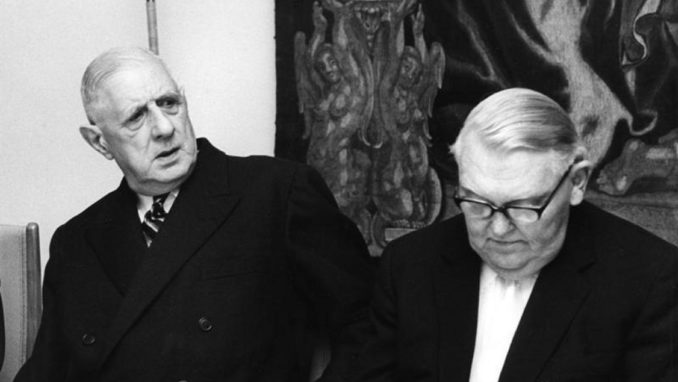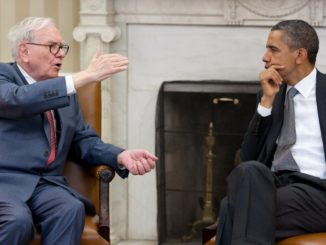
Bundesarchiv, B 145 Bild-F020548-0018 / Steiner, Egon / CC-BY-SA 3.0, CC BY-SA 3.0 DE, via Wikimedia Commons
Liz Truss and Kwasi Kwarteng have had to bear the brunt of the markets’ predictable reaction to their mini-budget last month. Although amateurishly presented and poorly explained, it was nevertheless replete with strategy for growth. Given half a chance it had potential to reinvigorate our ailing economy. Instead it was given the thumbs-down by the very “markets” guilty of 10 years of unremitting currency destruction.
When Covid was a feature of daily life those markets raised few concerns about the direction government lockdowns were taking the country, or their consequences. Let’s be clear: like other economic actors, market players are in it for the money. They are risk-averse forecasters who bet on the very outcomes they do their best to contrive. The markets sounded no distress signals when government took over paying the wages of huge numbers of “workers forbidden to work” – being confined to their homes. What about productive growth? It’s too risky, and markets detest the original thinking on which opportunities for growth rely. Markets react favourably to growth, of course – but only after it’s happened; never when its potential is being nurtured.
Sunak’s mandate
What kind of mandate does Rishi think he has? Does he really believe that, given a choice, people would have voted for a PM with an agenda of lifting taxes to a 70-year high? People have had their fill of Westminster upheavals and he was lucky to be the one in place when the mayhem ceased. He should be reminded that the Tories’ huge 2019 majority was not a vote in favour of Johnson; it was an overwhelming vote against Corbyn.
The history of political economy reveals certain timeless truths: (i) raising taxes disincentivises those affected because it gives them less reason to work hard; (ii) when taxes are raised new businesses have less reason to choose this economy to invest in and operate from; and (iii) when disposable income falls, so does consumption and, as a result, there is no growth.
Statist Solutions
Modern governments invariably invoke statist solutions for every problem. We are now hearing calls for a global “whip-round” to pay for rebuilding Ukraine, at a cost estimated by the World Bank to be $350 billion. This is an echo of the post-WW2 “Marshall Plan”, an idea now supported by the usual suspects, Macron, Scholtz, von der Leyen, Lagarde and the other peas-in-a-pod beneficiaries of today’s free-for-all European economic model. But, as usual, they’ve got hold of the wrong end of the stick.
In his recent interview with Claudio Grass, Vaclav Klaus, former President of the Czech Republic, points out that the post-WW2 European reconstruction was as much the work of Bavarian free-marketeer Ludwig Erhard as George Marshall. As Klaus puts it, “foreign aid always pleases the donors – it’s not their own money they’re giving away.” For the record, on 21 June 1948 it was Ludwig Erhard who launched the Deutsche Mark, a new currency to replace the worthless old remnant, together with large tax cuts to spur investment.
On the same day, deeply controversially (but inspirationally), Erhard decided to remove all existing price controls – whereupon he was summoned to the office of U.S. General Lucius Clay, the commanding officer overseeing the occupied western half of Germany. Clay told Erhard that, in the opinion of his advisers, Erhard’s drastic new policy would be a terrible mistake. Famously, Erhard responded, “Don’t listen to them, General. My advisers tell me the same thing.”
Return of German industriousness
Erhard was a man who took his own inner counsel and was not cowed by ephemeral constructs of contrarian persuasion – such as advisers or markets, and he proved his critics wrong. “Almost overnight”, wrote Lucius Clay, “hoarded goods began to move into the stores. Even fruit and vegetables from the farm once more went on sale in the market place. Germany is going back to work.” Shops immediately became stocked with goods as traders and people realized that the new currency was working as effectively as Erhard had promised. Bartering ceased, and the black market ended. As the commercial marketplace took hold, people once again had an incentive to work. West Germany’s famed sense of industriousness returned.
Erhard’s unshakeable belief in the virtue of self-reliance rather than state-reliance was re-enacted almost contemporaneously by the architect of Hong Kong’s economic miracle, John Cowperthwaite, whose principal influences were the teachings of classical economists – Adam Smith and Ricardo in particular. It was Smith, the visionary, whose “Wealth of Nations” explained that a system rooted in self-interest will always offer the greatest benefit to all; and concluded that the state should be there to facilitate this natural process, not to dominate it. A small, focused government would best enhance the wealth of a nation.
Predictive (and predictable) failure
Closer to home, we recall the classic case of the 364 academic economists who wrote a letter to The Times on 30th March 1981 condemning the budget that Thatcher and Howe had just delivered. They wrote: “Present policies will deepen the depression, erode the industrial base of our economy and threaten its social and political stability.” The timing was exquisite: from that moment the economy embarked on a prolonged phase of vigorous growth.
This wasn’t a one-off. Since then the predictive failures of City big shots like the Bank of England governor, acronymic quangos like OBR, IFS, ONS, IMF, BIS and the rest – indeed, the markets themselves, have become legion. If one of them bids you good morning, do look at your watch! (It also showed, incidentally, why Cowperthwaite in Hong Kong banished all statisticians from his administration.)
Nor is it necessary to refer to historical illustrations of conditions conducive to wealth creation. Consider for a moment the mid-term USA elections and Florida’s governor Ron DeSantis, who may well become President in 2024. Florida’s economy is flourishing because it has no state income tax and low regulation. During the pandemic DeSantis resisted the severest forms of lockdown, opposed mask mandates and kept schools and businesses open – all in stark contrast to the UK’s draconian stay-at-home laws. In Florida the focus is the greater good – and we glimpse democracy in action, not words. I suspect that anyone gluing themselves to the turnpike would be forcibly carted off to an institution of correction!
We are unrepresented!
Our problem is that we now have no political party that listens to us, still less represents our views. The Tories have completely given up on small-state, low-regulation government. They have tossed aside their core belief in the virtue of individual responsibility and personal motivation. Their 1992 manifesto, “Unleashing Britain’s Potential”, now reads like a long-lost utopian testament: “You, and not the government, should be in charge of your life. That’s what Conservatism stands for – a society in which government doesn’t try to take responsibility away from people, and politicians must never make the mistake of thinking the state always knows best.”
Can you believe it? The Sunak/Hunt strategy presents the opposite picture: it tells us we are now “sharing risks collectively”, which is, of course, their justification for the latest tax rises. The state’s role in supporting the vulnerable needs money, of course – but not the counterfeited variety. It needs money created by enterprise and real businesses. That alone is the source of wealth that enables us to pay for the public services on which the vulnerable members of society depend.
Forget artificial concepts like “aggregate demand” – circumstances will consign them to the archive of failed ideas. The only way out of this morass is to reawaken government to Say’s Law: “We produce in order to consume”. Without production there can be nothing to consume. Simple, obvious and incontrovertible. Productive enterprise, once released from the fetters of state bureaucracy, needs no stimulus. It’s natural.
© Emile Woolf November 2022 (website)



